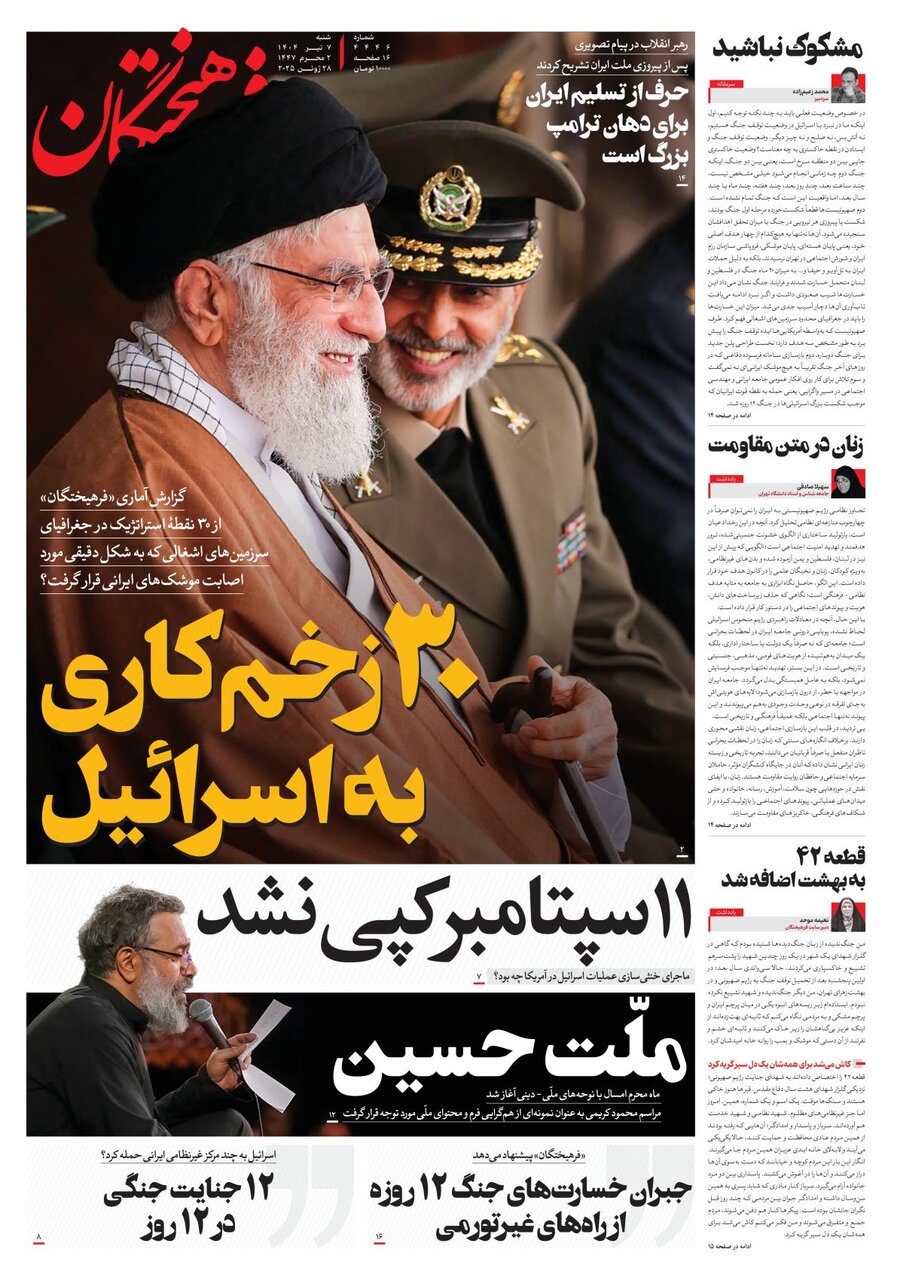A September 11-style scenario was ultimately not carried out

TEHRAN - In an article, Farhikhtegan analyzed an exclusive report by the Tehran Times, claiming that the Zionist regime had planned a destructive explosion on U.S. soil intended to be falsely attributed to Iran.
According to the article, the alleged false flag operation sought to fabricate evidence, implicate Iran, and provide a pretext for a full-scale U.S. war against the country. The plan—reportedly aimed at manipulating American public opinion and legitimizing military aggression—was uncovered through intelligence received from a friendly nation. Upon learning of the scheme, Iran reportedly sent warnings to American officials, leading to the plan’s disruption. Although the United States played a highly active role in Israel’s 12-day war against Iran, the operation was designed to fully draw Washington into the conflict by replicating the shock and political consequences of the September 11 attacks.
Sobh-e-No: Iran must be vigilant as Israel doesn’t honor ceasefires
In an analysis, Sobh-e-No highlighted Israel’s history of breaching agreements and lack of commitment to ceasefires and the need for Iran to remain fully ready for violation of the ceasefire that went into effect on June 25. It wrote: Despite the official declaration of a ceasefire between the Islamic Republic of Iran and the Zionist regime, historical evidence shows that the Israeli regime often does not commit to agreements. This ceasefire agreement has seemingly created hope for a temporary halt to attacks. The Islamic Republic of Iran must continue to maintain its vigilance at the highest level. Complete defensive and operational readiness, along with strengthening defense and intelligence systems, is necessary to deal with any betrayal or re-attack by the Zionist regime. At the same time, the country's diplomatic apparatus must reflect the regime's repeated violations of international rules and inform the global public opinion of the unreliable nature of Israel. In the current circumstances, trusting the Zionist regime's commitment to a ceasefire without deterrent measures and full readiness would be nothing more than naivety. This regime has repeatedly shown that it does not adhere to any of international rules and regulations. Therefore, staying prepared and alert is the only way to protect the country's national security.
Donya-e-Eqtesad: Intelligent silence
In a note, Donya-e-Eqtesad addressed Iran's intelligent silence towards the West and wrote: The ceasefire that was recently agreed between Iran and Israel with Washington's mediation was not out of moral concern or for peace, but to prevent the spread of tension to energy markets and America's global competition with China. America's military involvement in the recent war was limited and calculated. Trump has adopted an ambivalent position. In response to the recent conflict, he said: "Both Iran and Israel violated the agreement, and I am not happy with either of them." This artificial neutrality is precisely a reflection of the same cost-oriented view of the region. Therefore, now that neither Washington has an incentive to continue sanctions nor Tel Aviv - consciously or unintentionally - has maintained the image of a threat, Iran should not rush to prove that it is a danger. The best response at this moment is an intelligent silence. In politics, you don't always have to speak for yourself. Sometimes it is enough to wait for the other party to speak your language without knowing it, and make others doubt.
Iran: “Strategic solitude” a choice or fate of history?!
Theorists of “strategic solitude” believe that Iran can never be part of the orbit of the great coalitions of world powers, not because of political mistakes, but because of the country’s particular characteristics, such as the Persian language, the Shiite religion, and its specific geographical location. From their view, the great powers of the region do not consider Iran as part of their strategic team. As a result, Iran is forced to rely on itself and follow the path of authority from within, by strengthening internal power and increasing popular legitimacy. Contrary to the common perception of strategic solitude, Iranian analysts see it as an opportunity for independent action in the region. They believe that Iran’s historical experience has been filled with the betrayal of great powers, from Russia and Britain to today’s America and China. According to this view, Iran can never rely on others, because others always make and break agreements in line with their preferences. Iran's strategic solitude is the result of its political system, prevailing discourse, and the Islamic Republic’s deliberate orientation in foreign policy. This perspective views the phenomenon not as inherent, but as a political and discursive construct.
Leave a Comment